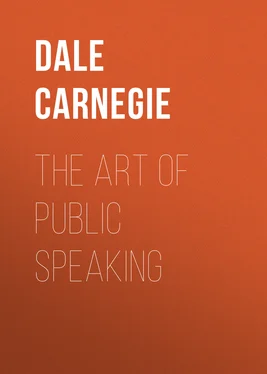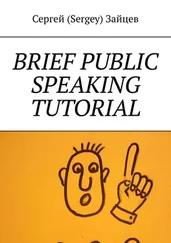This truth is worth reiteration: The man within is the final factor. He must supply the fuel. The audience, or even the man himself, may add the match—it matters little which, only so that there be fire. However skillfully your engine is constructed, however well it works, you will have no force if the fire has gone out under the boiler. It matters little how well you have mastered poise, pause, modulation, and tempo, if your speech lacks fire it is dead. Neither a dead engine nor a dead speech will move anybody.
Four factors of force are measurably within your control, and in that far may be acquired: ideas , feeling about the subject , wording , and delivery . Each of these is more or less fully discussed in this volume, except wording, which really requires a fuller rhetorical study than can here be ventured. It is, however, of the utmost importance that you should be aware of precisely how wording bears upon force in a sentence. Study "The Working Principles of Rhetoric," by John Franklin Genung, or the rhetorical treatises of Adams Sherman Hill, of Charles Sears Baldwin, or any others whose names may easily be learned from any teacher.
Here are a few suggestions on the use of words to attain force:
Choice of Words PLAIN words are more forceful than words less commonly used— juggle has more vigor than prestidigitate . SHORT words are stronger than long words— end has more directness than terminate . SAXON words are usually more forceful than Latinistic words—for force, use wars against rather than militate against . SPECIFIC words are stronger than general words— pressman is more definite than printer . CONNOTATIVE words, those that suggest more than they say, have more power than ordinary words—"She let herself be married" expresses more than "She married ." EPITHETS, figuratively descriptive words, are more effective than direct names—"Go tell that old fox ," has more "punch" than "Go tell that sly fellow ." ONOMATOPOETIC words, words that convey the sense by the sound, are more powerful than other words— crash is more effective than cataclysm .
Arrangement of words Cut out modifiers. Cut out connectives. Begin with words that demand attention. "End with words that deserve distinction," says Prof. Barrett Wendell. Set strong ideas over against weaker ones, so as to gain strength by the contrast. Avoid elaborate sentence structure—short sentences are stronger than long ones. Cut out every useless word, so as to give prominence to the really important ones. Let each sentence be a condensed battering ram, swinging to its final blow on the attention. A familiar, homely idiom, if not worn by much use, is more effective than a highly formal, scholarly expression. Consider well the relative value of different positions in the sentence so that you may give the prominent place to ideas you wish to emphasize.
"But," says someone, "is it not more honest to depend the inherent interest in a subject, its native truth, clearness and sincerity of presentation, and beauty of utterance, to win your audience? Why not charm men instead of capturing them by assault?"
Why Use Force?
There is much truth in such an appeal, but not all the truth. Clearness, persuasion, beauty, simple statement of truth, are all essential—indeed, they are all definite parts of a forceful presentment of a subject, without being the only parts. Strong meat may not be as attractive as ices, but all depends on the appetite and the stage of the meal.
You can not deliver an aggressive message with caressing little strokes. No! Jab it in with hard, swift solar plexus punches. You cannot strike fire from flint or from an audience with love taps. Say to a crowded theatre in a lackadaisical manner: "It seems to me that the house is on fire," and your announcement may be greeted with a laugh. If you flash out the words: "The house's on fire!" they will crush one another in getting to the exits.
The spirit and the language of force are definite with conviction. No immortal speech in literature contains such expressions as "it seems to me," "I should judge," "in my opinion," "I suppose," "perhaps it is true." The speeches that will live have been delivered by men ablaze with the courage of their convictions, who uttered their words as eternal truth. Of Jesus it was said that "the common people heard Him gladly." Why? "He taught them as one having AUTHORITY ." An audience will never be moved by what "seems" to you to be truth or what in your "humble opinion" may be so. If you honestly can, assert convictions as your conclusions. Be sure you are right before you speak your speech, then utter your thoughts as though they were a Gibraltar of unimpeachable truth . Deliver them with the iron hand and confidence of a Cromwell. Assert them with the fire of authority . Pronounce them as an ultimatum . If you cannot speak with conviction, be silent.
What force did that young minister have who, fearing to be too dogmatic, thus exhorted his hearers: "My friends—as I assume that you are—it appears to be my duty to tell you that if you do not repent, so to speak, forsake your sins, as it were, and turn to righteousness, if I may so express it, you will be lost, in a measure"?
Effective speech must reflect the era. This is not a rose water age, and a tepid, half-hearted speech will not win. This is the century of trip hammers, of overland expresses that dash under cities and through mountain tunnels, and you must instill this spirit into your speech if you would move a popular audience. From a front seat listen to a first-class company present a modern Broadway drama—not a comedy, but a gripping, thrilling drama. Do not become absorbed in the story; reserve all your attention for the technique and the force of the acting. There is a kick and a crash as well as an infinitely subtle intensity in the big, climax-speeches that suggest this lesson: the same well-calculated, restrained, delicately shaded force would simply rivet your ideas in the minds of your audience. An air-gun will rattle bird-shot against a window pane—it takes a rifle to wing a bullet through plate glass and the oaken walls beyond.
When to Use Force
An audience is unlike the kingdom of heaven—the violent do not always take it by force. There are times when beauty and serenity should be the only bells in your chime. Force is only one of the great extremes of contrast—use neither it nor quiet utterance to the exclusion of other tones: be various, and in variety find even greater force than you could attain by attempting its constant use. If you are reading an essay on the beauties of the dawn, talking about the dainty bloom of a honey-suckle, or explaining the mechanism of a gas engine, a vigorous style of delivery is entirely out of place. But when you are appealing to wills and consciences for immediate action, forceful delivery wins. In such cases, consider the minds of your audience as so many safes that have been locked and the keys lost. Do not try to figure out the combinations. Pour a little nitro glycerine into the cracks and light the fuse. As these lines are being written a contractor down the street is clearing away the rocks with dynamite to lay the foundations for a great building. When you want to get action, do not fear to use dynamite.
The final argument for the effectiveness of force in public speech is the fact that everything must be enlarged for the purposes of the platform—that is why so few speeches read well in the reports on the morning after: statements appear crude and exaggerated because they are unaccompanied by the forceful delivery of a glowing speaker before an audience heated to attentive enthusiasm. So in preparing your speech you must not err on the side of mild statement—your audience will inevitably tone down your words in the cold grey of afterthought. When Phidias was criticised for the rough, bold outlines of a figure he had submitted in competition, he smiled and asked that his statue and the one wrought by his rival should be set upon the column for which the sculpture was destined. When this was done all the exaggerations and crudities, toned by distances, melted into exquisite grace of line and form. Each speech must be a special study in suitability and proportion.
Читать дальше












